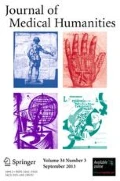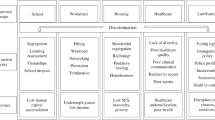Abstract
Foucault's work has had a profound impact on the medical humanities over the last decade or so. However, most work to date has focused on Foucault's earlier writings rather than his later contributions on the self and governmentality. This article assesses the significance of the concept of governmentality for critical scholarship in the medical humanities, particularly in creating ethical awareness in the field of health care. It examines the context for Foucault's later work, and contributions arising from scholarship building on this work. The governmentality literature, it is argued, raises novel questions about the ways we have come to think about health care in late modern societies. However, there are some limitations with this body of work which have not been fully acknowledged by scholars. The article discusses some of these limitations and offers some suggestions for a fruitful way forward.
Similar content being viewed by others
References
Armstrong, D. (1983). Political anatomy of the body: Medical knowledge in Britain in the twentieth century. Cambridge: Cambridge University Press.
Barry, A., Osborne, T., & Rose, N. (Eds.). (1996). Foucault and political reason: Liberalism, neoliberalism and rationalities of government. London: UCL Press.
Bernauer, J. W. (1991). Michel Foucault's ecstatic thinking. In J. Bernauer & D. Rasmussen, (Eds.), The final Foucault (pp. 45–82). Cambridge, MA: The MIT Press.
Bernauer, J., & Rasmussen, D. (Eds.). (1991). The final Foucault. Cambridge, MA: The MIT Press.
Broom D. (1991). Damned if we do: Contradiction in women's health care. Sydney: Allen & Unwin.
Burchell, G., Gordon, C., & Miller, P. (Eds). (1991). The Foucault effect: Studies in governmentality. London: Harvester Wheatsheaf.
Burchell, G. (1993). Liberal government and techniques of the self. Economy and Society 22, 267–282.
Carrington, K., & Watson, P. (1996). Policing sexual violence: Feminism, criminal justice and governmentality. International Journal of the Sociology of Law, 24, 253–272.
Clarke, A. (1991). Is non-directive counselling possible? The Lancet, 338, 998–1001.
Cruikshank, B. (1993). Revolutions within: Self-government and self-esteem. Economy and Society, 22(3), 327–344.
Davison, C., Davey Smith, G., & Frankel, S. (1991). Lay epidemiology and the prevention paradox: The implications of coronary candidacy for health education. Sociology of Health and Illness, 13(1), 1–19.
de Certeau, M. (1984). The practice of everyday life. Berkeley, CA: University of California Press.
Foucault, M. (1977). Discipline and punish: The birth of the prison. Harmondsworth: Penguin.
Foucault, M. (1980). The history of sexuality: Volume I: An introduction. New York: Vintage Books.
Foucault, M. (1987). The use of pleasure: The history of sexuality (Vol. 2). London: Penguin.
Foucault, M. (1990). The care of the self: The history of sexuality (Vol. 3). London: Penguin.
Foucault, M. (1991). The ethic of care for the self as a practice of freedom: An interview with Michel Foucault on January 20, 1984. In J. Bernauer & D. Rasmussen (Eds.), The final Foucault (pp. 1–20). Cambridge, MA: The MIT Press.
Garland, D. (1997). Governmentality and the problem of crime: Foucault, criminology, sociology. Theoretical Criminology, 1(2, 173–214.
Gordon, C. (1991). Governmental rationality: An introduction. In G. Burchell, C. Gordon, & Miller, P. (Eds.), The Foucault effect: Studies in governmentality (pp. 1–51). London: Harvester Wheatsheaf.
Hacking, I. (1986). Making up people. In T. C. Heller, M. Sosna, & D. E. Wellberg (Eds.), Reconstructing individualism: Autonomy, individuality and the self in western thought (pp. 222–236). Stanford, CA: Stanford University Press.
Hill, S. A. (1994). Motherhood and the obfuscation of medical knowledge: The case of sickle cell disease. Gender and Society, 8(1), 29–47.
Hughes, E. (1997). Health promotion and non-compliance: An analysis of resistance to regulatory technologies. Annual Review of Health Social Sciences, 7, 18–27.
Irvine, R. (1996). Losing patients: Health care consumers, power and sociocultural change. In C. Grbich, (Ed.), Health in Australia: Sociological concepts and issues (pp. 191–214). Sydney: Prentice Hall.
Kinsman, G. (1996). ‘Responsibility’ as a strategy of governance: Regulating people living with AIDS and lesbians and gay men in Ontario. Economy and Society, 25(3), 393–409.
Kritzman, L. D. (Ed.). (1988). Michel Foucault: Politics, philosophy, culture (Interviews and Other Writings 1977–1984). New York: Routledge.
Macintyre, C. (1999). From entitlement to obligation in the Australian welfare state. Australian Journal of Social Issues, 34(2), 103–118.
McNay, L. (1992). Foucault and feminism: Power, gender and the self. Cambridge: Polity Press.
Nettleton, S. (1992). Pain, power and dentistry. Buckingham, UK: Open University Press.
O'Malley, P. (1996a). Indigenous governance. Economy and Society, 25(3), 310–326.
O'Malley, P. (1996b). Risk and responsibility. In A. Barry, T. Osborne, & N. Rose, (Eds.), Foucault and political reason: Liberalism, neo-liberalism and rationalities of government (pp. 189–208). London: UCL Press.
O'Malley, P. (1998). Consuming risks: Harm minimisation and the government of drug users. In R. Smandych (Ed.), Governable places: Readings in governmentality and crime (pp. 191–214). Brookfield, VT: Ashgate.
O'Malley, P., Weir, L., & Shearing, C. (1997). Governmentality, criticism, politics. Economy and Society, 26(4), 501–517.
Petersen, A. (1998). The new genetics and the politics of public health. Critical Public Health, 8(1), 59–71.
Petersen, A. (1999). Counselling the genetically “at risk”: The poetics and politics of “nondirectiveness.” Health, Risk and Society, 3(1), 253–265.
Petersen, A., & Lupton, D. (1996). The new public health: Health and self in the age of risk. London: Sage.
Rose, N. (1993). Government, authority and expertise in advanced liberalism. Economy and Society, 22(3), 283–299.
Rose, N. (1996). The death of the social? Re-figuring the territory of government. Economy and Society, 25(3), 327–356.
Rose, N. (1999). Powers of freedom: Reframing political thought. Cambridge, UK: Cambridge University Press.
Rose, N. & Miller, P. (1992). Political power beyond the state: Problematics of government. British Journal of Sociology, 22(3), 283–299.
Sawicki, J. (1991). Disciplining Foucault: Feminism, power and the body. New York: Routledge.
Shapira, A. (1998). Wrongful life lawsuits for faulty genetic counselling: should the impaired newborn be entitled to sue? Journal of Medical Ethics, 24, 369–375.
Silverman, D. (1987). Communication and medical practice: Social relations in the clinic. London: Sage.
Stenson, K. (1998). Beyond histories of the present. Economy and Society, 27(4), 333–352.
Turner, B. S. (1997). Forward: From governmentality to risk, some reflections on Foucault's contribution to medical sociology. In A. Petersen & Bunton, R. (Eds.), Foucault, health and medicine (pp. ix-xxi). London: Routledge.
Valverde, M. (1996). “Despotism” and ethical liberal governance. Economy and Society, 25(3), 357–372.
Weir, L. (1996). Recent developments in the government of pregnancy. Economy and Society, 25(3), 372–392.-
Author information
Authors and Affiliations
Corresponding author
Rights and permissions
About this article
Cite this article
Petersen, A. Governmentality, Critical Scholarship, and the Medical Humanities. Journal of Medical Humanities 24, 187–201 (2003). https://doi.org/10.1023/A:1026002202396
Issue Date:
DOI: https://doi.org/10.1023/A:1026002202396




